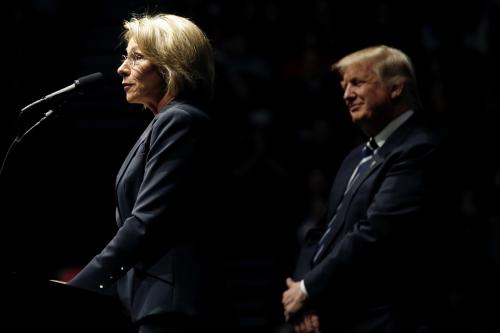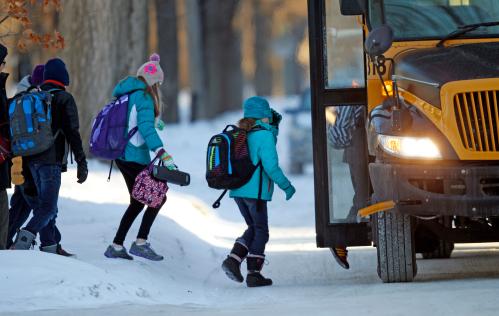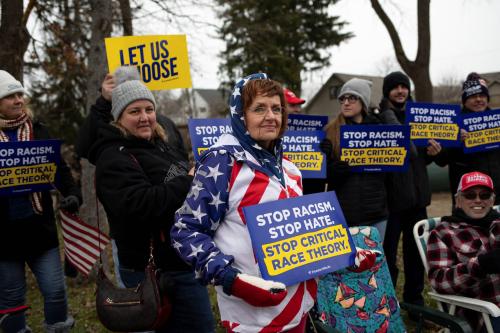In prior posts, I argued that education is likely to play a major role in the Democratic primaries. This is due to several factors, including: the growing importance of education as a national issue, the unions’ continued power, and the possibility that no Democrat will emerge with a majority of votes prior to the convention where institutional power players like unions have an outsized role.
Unfortunately for Democrats, education will play a big role for another reason as well. Charter school policy has become a divisive issue within the party. For the left wing of the party, it is an opportunity to support public education, oppose privatization, and gain support of the powerful teacher unions all at the same time. All the while, all but one of the top-tier presidential candidates has either been neutral or supportive of charter schools in the past. All are now being forced to the left on the issue, opposing charters more and more. However, as I explain, the positions the candidates are taking are not nearly as hostile to charter schools as it might seem. Even if one of the more skeptical candidates were to win the presidency and adopt their policies, charter schooling is likely to continue its steady expansion.
How did we get here?
To understand where this is going, we have to understand how we got where we are today. Why are charter schools such a hot topic? First, charter schools now represent at least 6% of the publicly funded schooling market, a number that has steadily increased the inception of charter schools almost three decades ago. Second, in some cities, like my hometown of New Orleans, charter schools have either mostly or completely replaced traditional public schools, something no one thought imaginable (or even desirable) when charter schools first started. Third, the Democratic Party has turned to the left with skepticism of private organizations (especially for-profits) and markets generally. Fourth, support for charter schools is starting to cut more along racial lines. Charter schools are therefore cleaving a divide on two dimensions at once: an ideological divide between neoliberals and progressives and a racial divide that is especially problematic in a multiracial party. The backlash against charter schools began to be evident in the debate over ESSA and the rollback of NCLB and the Barack Obama-era waivers. This general anti-reform sentiment then got into full swing with the 2016 presidential election. Hillary Clinton, once a strong supporter of charter schools, backpedaled in the 2016 Democratic primary with criticism of charter schools (though with no explicit proposals that would have undermined charters). Then came the results of the election. After making occasional statements advocating school choice during his campaign, President Trump appointed Betsy DeVos for secretary of education, perhaps the most significant behind-the-scenes political supporter of charter schools (and vouchers) in the country. It is difficult for Democrats to support any policy that the Trump administration endorses, and DeVos’ appointment widened the already-growing breach among Democrats. So, how are candidates playing the charter hand they’ve been dealt? Before I answer that question, a few small disclosures: I have had past conversations with two of the candidates (Joe Biden and Elizabeth Warren) about education issues. I also supported and advised the Obama-Biden administration on several issues (though I am not presently advising the campaigns of any declared candidates).
Candidate positions on charter schools
I have analyzed the education policy positions of the top-tier Democratic primary candidates. To avoid cherry picking, I picked the “top tier” based a single source: Nate Silver’s analysis of the polling data as of April 26. The top seven candidates on his list are (in order of polling): Joe Biden, Bernie Sanders, Pete Buttigieg, Elizabeth Warren, Kamala Harris, Beto O’Rourke, and Cory Booker. Apologies if your favorite candidate has been left out, but there are simply too many candidates this year to consider them all at length (and most of my analysis would apply even if we considered all the candidates). On charter schools, the top-tier candidates break down into five categories:
- Consistent public supporters of charter schools (None)
- Supported charter schools in the past but since backed off (Warren, O’Rourke, Booker)
- No clear position on charter schools (Buttigieg)
- No clear position before but currently a charter skeptic (Biden)
- Long-time opponents of charter schools (Sanders, Harris)
Let me start from the beginning and work my way down, noting that this list has changed twice in the past three weeks. When I started writing this piece three weeks ago, there was, in fact, one steady supporter: Booker. He was not just a supporter, either. Having gone on Oprah with Mark Zuckerberg and Republican Chris Christie to announce a massive overhaul (and charterization) of the Newark, New Jersey schools, charter schools were his signature issue. He even spoke at a conference hosted by DeVos’ organization (before she became secretary). He later tried to address this obvious political problem by opposing DeVos’ nomination. As I started writing this post, I thought Booker would stick to his guns, and become the only candidate who would speak to and for charter supporters, including the growing charter establishment and wealthy philanthropists who have long supported him. But, then, he came out with this just a few days ago with this in a campaign stump speech: “I’m a guy who believes in public education and, in fact, I look at some of the charter laws … and I find them sickening.” (This comes from a video posted by The Hill on Twitter.) To be clear, this statement is not a complete abandonment of charters, but can you imagine Sanders saying that Medicare laws are “sickening”? I never thought I’d hear this from Booker. It’s not even clear that it was good politics, since he just swerved out of the only lane he had to himself. Joining Booker is O’Rourke who, as recently as 2016, talked about charter schools as a “proven educational model.” In 2015, O’Rourke also spoke positively about charters. Since 2016, however, it’s been mostly silence and more backpedaling. His spokesperson recently said: “He has made it clear that our focus should be on, and our taxpayer funds should go towards, public school classrooms where the overwhelming majority of American students attend.” Warren is in the same boat. A longtime Republican, she was a charter supporter until she turned against them in a 2016 referendum in her home state of Massachusetts. Booker, O’Rourke, and Warren are therefore all following Clinton’s 2016 lead.
Buttigieg has said very little about policy so far, though the fact that his husband, Chasten, was a private school teacher before joining the campaign full time has drawn headlines. Biden managed to go several decades seemingly saying nothing about charter schools. Then, last week followed in the direction of the others and embraced a ban on for-profit charter schools. Sanders is partly the impetus for all of this. His recent proposals would ban for-profit charter schools and put a moratorium on their growth. As Biden and Sanders are the two leading candidates in the race, and given the leftward swing in the party, their jujitsu on this issue is telling. Note that Biden’s proposal is narrower and more realistic in banning only federal funding for for-profit charter schools. Harris, meanwhile, has opposed for-profit charter schools, but apparently hasn’t said anything about a moratorium. Where does that leave us? In some ways this is standard fare: Moderate candidates tack to extreme wings of the party in the primary and (likely) tack back to the middle in the general election. Of course, that logic only holds if a moderate candidate wins. Sanders has nowhere to tack back to. In the meantime, we can expect the polling on charter schools to get worse. The average voter might not hear a single positive message about charter schools for the next 12 months and, if they do, it will most likely come from President Trump. That spells trouble. … Or does it?
The long-term prognosis is better for charter schools
Charter supporters actually hold a stronger hand than it seems, if we separate the short-term battle of the 2020 Democratic primary battle from the long-term war. Trump/DeVos will eventually be out of office. When Democrats take over again—whether in 2020 or beyond—the odds are that it will not be Sanders, but a candidate with moderate view on the issue. Sanders is really the only candidate who seems genuinely opposed to charter schools and even he is only calling for a moratorium and ban on the small share of charters that are for-profits. For all the attention and bluster, not a single candidate seems to want to turn back the clock and get rid of charter schools. Even if Sanders won the primary and general election, there would almost certainly be more charter schools in place after he left office than when he started. A federal ban on for-profits would no doubt apply only to federal funding for charter schools, which is small. Moreover, charter schooling has expanded almost nonstop for decades. Charter supporters have worried about the slowing growth of charter schools, but growth is growth, especially when it is happening as charter schools have been under political attack. This is telling about who’s really winning. It is also why unions are pushing back. The future also depends on where the evidence goes. I have written about this before. The short of it is that both sides exaggerate their claims. Charter critics are mostly wrong that charter schools are weakening traditional public schools and/or that they are making segregation worse. Likewise, charter supporters are wrong to dismiss the many scandals and mostly wrong that charter schools are allowing families to successfully escape failing schools. Average charter performance is only slightly better than traditional public schools nationally, meaning that when families leave traditional public schools for charters, they are about as likely to end up in a worse school than a better one. It’s a mixed bag. Charter schools have not transformed America’s schools, at least not yet. They do seem to be getting better over time and generating some meaningful improvements, at least in urban areas. If that continues, then this will certainly, and deservedly, help swing more independent voters to the charter cause. If not, then we may need to seriously rethink this. The next 12 months will be very uncomfortable for charter supporters, to be sure, and this will create a short-term political mess for the party. The reason for that mess is that charter supporters have been gradually winning the war. 6/12/19 correction: This piece previously stated that Pete Buttigieg’s husband, Chasten, was a charter school teacher. He was formerly a teacher at The Montessori Academy, which is a private school in Indiana, not a charter.







Commentary
Do the current Democratic politics spell doom for charter schools?
June 10, 2019